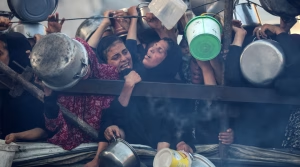We had planned to visit Israel in December as we do most years. We purchased our tickets back in July to fly direct via Air Canada. Everything changed on Oct. 7, of course, when the Jewish world was struck with the most horrific news since the Holocaust.
Although I had concerns about going, we did not cancel the trip. We waited. Finally, Air Canada cancelled our flights and we were able to get full refunds. It was November. My husband, a passionate Zionist, insisted we keep the dates and still go to show our support. Although most airlines discontinued flights to Israel, we were able to book with El Al via London, England.
My first encounter with reality hit on the flight from London to Tel Aviv. I sat next to an Israeli-British lady whose uncle had been killed on Oct. 7 at Kibbutz Kfar Aza. She explained how she had attended the funeral which took place outside Tel Aviv as it was impossible to bury him near the kibbutz.
She was still very distraught and could not come to terms with how the authorities had not been able to prevent the massacre.
We finally arrived in Israel and settled in. Back in Toronto, we had lined up some volunteering activities at an organization called Pantry Packers which had been set up by Chabad to pack food for needy families.
Since the schools were closed, students had the opportunity to volunteer their time for this cause. At Pantry Packers we were constantly surrounded by students and music. The louder the music, the greater the energy in packing up crates with oatmeal packages, corn and lentils to be shipped off.
During our stay, we connected with friends and relatives who have had to deal with a child or grandchild who was in the army. One good friend had her two boys in Gaza. The only way for her to get some rest was by taking sleeping pills to calm her nerves.
Another friend stays close to home for fear of a siren warning of a rocket attack while she is driving. Another friend had four grandsons in the army all at the same time.
Tour guides are volunteering in agriculture as there are no tourists. Some stores in malls have closed. Some restaurants created displays of an empty table with pictures of hostages on the seats.
Some busy bus stops have also displayed empty chairs featuring those who have been kidnapped.
One wonderful visit we had was to the headquarters of Magen David Adom. We were given a tour and overview of what happened on Oct. 7. They also demonstrated their new app which permits users to be in touch with medical professionals even before the ambulance arrives. They also told us about the fortified underground blood bank in Ramla which opened the week of Oct 7.
We were lucky to join a day trip from Jerusalem to harvest eggplants at a moshav near Bet Shemesh. Eighteen of us helped to fill the gap left by foreign workers who had returned to their homes after the war.

Before the war, the moshav relied on 30 workers, now there were only eight from Thailand. Among the volunteers, I met two very lovely young ladies from Australia. One had eight children and her sister-in-law had four. They left their children with their husbands in Melbourne to come and volunteer their time.
We later visited a hotel and met with displaced people from Kibbutz Shlomit in the south. They have been relocated there since Oct. 7 and were far from being able to return “home” making it very difficult on all, especially the children.
Through Mizrachi Canada, we joined a day of their mission which included a stop to Kibbutz Kfar Aza, which is only four kilometres from the border with Gaza. From the bus, we could see the smoke from afar and hear the sounds of constant bombing. We were told about the simultaneous attacks at the back of the kibbutz while paragliders landed in the central residential area.
As we walked around and saw the devastation, we saw photos—by now very familiar—of those who perished and those who were taken hostage. At Kfar Aza, our group of 18 donated safety vests and helmets to the kibbutz for their security.
We had a chance to plant lettuce in Moshav Kfar Maimon and then visit soldiers in rehabilitation at Soroka Medical Center in Be’er Sheva. It really touches your heart to see how 18- and 20-year-olds, just kids really, have to go through all this. We were very privileged to be able to join in with songs and dancing at a military base close to Gaza at a barbecue for the soldiers.
Everywhere we went, all the volunteers received a very warm “thank you” for coming to Israel and for the support and time we were able to contribute.
I had reservations about going to Israel in this time of war. But as I walked the hallways in Ben Gurion Airport when leaving Israel, I was sad but also happy that we came to show our support. I can only recommend that for those who are able to travel, that you either join a mission or go on your own.
Israel needs you. The People of Israel need to know you care.
Grace Zweig has been working in advertising sales at The CJN for nearly 30 years. Other organizations to help you plan volunteer time in Israel are Leket and Sarel Canada.







